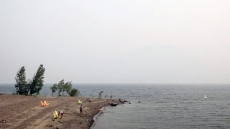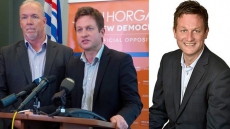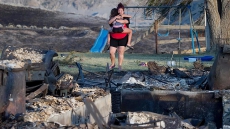VANCOUVER — The Insurance Corporation of British Columbia is under pressure on three fronts, all of which are contributing to a sharp increase in proposed rates for drivers, spokeswoman Joanna Linsangan says.
More crashes, more damage and injury claims, and higher costs associated with those claims mean higher rates are needed to cover expenses.
Here is an outline of those factors and how they have changed in recent years:
— There are about 875 crashes on an average day in B.C., resulting in payouts of almost $13 million in claims. The number of crashes jumped by 23 per cent between 2013 and 2016.
— Injury payouts have soared 80 per cent over the last seven years, while vehicle repair costs increased by 30 per cent between 2014 and 2016.
— B.C. is the only province with no restrictions on filling lawsuits for vehicle accident claims, meaning victims tend to receive higher medical benefit and rehab pay-outs, but also higher legal costs for the Crown corporation.
— Between 2004 and 2016, the percentage of claims involving legal representation doubled, from about 25 per cent to more than 50 per cent. Claims with legal representation are more expensive, partly because of legal fees and the need for expert reports and medical tests.

Once-Feted B.C. Auto Insurer Is A Wreck, No Clear Path To A Lasting Fix
British Columbia's once-celebrated public auto insurer has become a financial train wreck, its critics say as studies into the beleaguered Crown corporation call for dramatic rate hikes and drastic structural changes to save it from ruin.
But while everyone appears to agree the system is broken, there is disagreement over how the Insurance Corporation of British Columbia went off the rails in the first place and what must be done to fix it.
The crisis at ICBC is shaping up to be the first major financial hurdle for B.C.'s new NDP government.
Attorney General David Eby, who is also the minister responsible for ICBC, blames the previous Liberal government for problems at the corporation.
"ICBC, as described to me by senior bureaucrats, is on the path to insolvency," Eby said. "It's very unfortunate that it's been left for so long, because I think there was really an opportunity to address this much earlier."

ICBC was created in the early 1970s by the province's first NDP government to provide affordable and universal auto insurance.
All B.C. vehicle owners are required to purchase basic coverage through the corporation, though in 1976 the government began allowing private insurers to compete in offering additional optional coverage.
Eby and other ICBC supporters single out the actions of former Liberal premier Gordon Campbell as marking the beginning of the corporation's troubles.
Campbell required ICBC to keep much higher amounts of backup capital. The resulting stockpile proved irresistible to politicians in 2010 following the global financial meltdown, critics say, when the government began siphoning hundreds of millions of dollars of "excess capital" almost every year.
In all, the Liberals withdrew $1.2 billion from the lucrative optional side of ICBC's business, and also transferred $1.4 billion to offset deficits on the compulsory side providing basic coverage beginning in 2012.
"The reason we're in a bind right now is that there's no more money left in the optional piggy bank," said retired civil servant Rick McCandless, who has written extensively on ICBC.
"The music has stopped. You can't play the game anymore. Somebody has to make some hard decisions. And that somebody is government."

Liberal member of the legislature John Yap said the New Democrats are playing politics in trying to lay blame for the problems at ICBC, which he largely attributed to the increasing number of collisions and claims year-over-year along with rising repair costs.
The Liberals' priority was to keep rates low and stable while improving the operations and finances of the corporation through a number of measures, including foregoing the dividends from the optional side of the business as of last year and rolling in a new information technology system that would save the corporation millions, he said.
"Government did take action," Yap said.
He said the Liberals understood there were challenges and had ICBC commission a third-party report on the financial situation to make recommendations, which the new government will be responsible to act on.
A recent report from Ernst & Young painted a dire picture at the Crown corporation, concluding that rates must increase by 30 per cent by 2019 to cover costs. A separate forecast released last November by ICBC indicated rates would need to increase by 42 per cent over the next five years to make up for expenses.
McCandless pointed to a footnote in the ICBC report that an additional $1.5 billion is required in "capital from other sources" between 2017 and 2020. He calculated the cumulative rate hike to be closer to 117 per cent over four years.
ICBC says an increase in accidents as well as both the number and cost of claims are contributing to its financial predicament. But experts say the insurance corporation has been slow to respond to the changes, which apply equally to other jurisdictions outside of B.C.
Greg Basham, senior vice-president of ICBC in the late 1990s, said the Liberals' decision to cut funding for the corporation's road safety program undermined efforts to curb that trend.

ICBC operates a full-tort legal system, as opposed to the no-fault model used in some other provinces that saves on pay-outs and legal fees by preventing victims from litigating for better compensation.
It becomes a question of affordability versus treating victims fairly, McCandless said.
"How much fairness can you afford?" he added.
While the Liberal government withdrew money from ICBC coffers, they were not the only government to artificially depress rates, McCandless said. The NDP in the late 1990s also "started playing games" with the Crown corporation when they introduced a five-year rate freeze.
While advocates tend to see ICBC as a good program gone awry, some free-enterprise proponents view it as fundamentally flawed, arguing it worked as well as it did for so long not because of the system but in spite of it.
Scott Hennig of the Canadian Taxpayers' Federation said consumers suffer because of B.C.'s mandatory basic insurance model, which he described as a monopoly that is vulnerable to political interference.
"Private or public, monopolies are bad for consumers," Hennig said.
"Politicians can't help themselves," he added, describing ICBC as a cash cow. "When you've created a system that's susceptible to it, it doesn't matter what party is in power."
B.C. drivers pay some of the highest auto insurance rates in the country while receiving some of the lowest pay-outs, said Aaron Sutherland of the Insurance Bureau of Canada.
Sutherland said a 2017 review of auto insurance in Ontario listed the average premium cost in B.C. in 2015 as $1,316, second only to Ontario. The report also said the average cost of an injury claim was $42,084, second last in the country ahead of only Nova Scotia.
"If we want to have a real discussion and truly fix the auto insurance system, competition needs to be included," Sutherland said.
The NDP government has not released a comprehensive plan for addressing the crisis at ICBC, though Eby described the situation as urgent.
The government faces an Aug. 31 deadline to submit filings ahead of ICBC's rate-setting hearing at the B.C. Utilities Commission.





